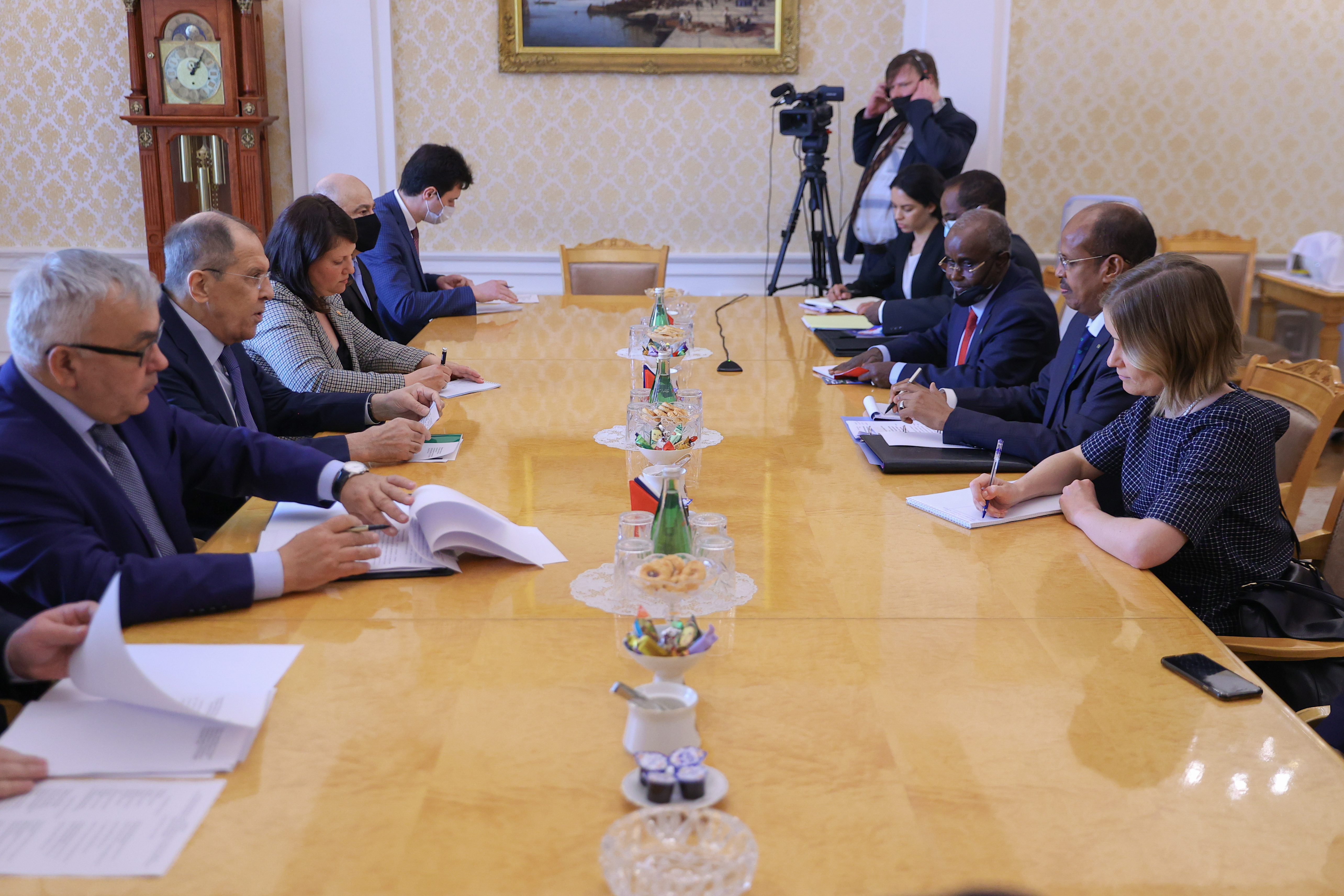
Russia's Interest in Djibouti
|
12 June 2021 08:28

Foreign Minister Sergey Lavrov has reaffirmed Russia's preparedness to make coordinated efforts aimed at raising bilateral economic cooperation with the Republic of Djibouti during diplomatic talks attended by Minister for Foreign Affairs and International Cooperation of the Republic of Djibouti Mahamoud Ali Youssouf who paid a working visit to Moscow early June.
Ahead of the diplomatic
talks, the Russian Ministry of Foreign Affairs, in its official media
statement, said the agenda included Russia-Djibouti cooperation in
politics, trade, the economy, investment activity, education and
healthcare, including implementation of potential joint projects in
Djibouti.
The
discussion would cover current issues on the regional and international
agendas with a focus on efforts to search for solutions in resolving
crises in Africa, primarily in the Horn of Africa area. Both ministers
would review some aspects of preparations for the second Russia-Africa
summit in 2022.
The
leadership of the Republic of Djibouti is pursuing a line on the
development of cooperation with Russia and shows interest in deepening
the inter-state dialogue, and expanding cooperation in trade, economic,
cultural and other fields. Objective conditions exist for enhanced
interaction between our two countries in the international arena. The
Republic of Djibouti plays an important role in sub-regional affairs.
"We
hope that the working visit of Mahamoud Ali Youssouf will be useful in
terms of strengthening collaboration with Djibouti on the international
scene and will contribute to the development of bilateral cooperation in
trade, economic and other fields,” the Foreign Ministry said.
Opening
the June 8 talks, Lavrov noted in remarks that current level of
interaction between Russia and Djibouti is far from the limit, the two
countries should create conditions to stimulate their trade and economic
ties for mutually beneficial projects in energy and agriculture. "Our
traditionally friendly bilateral relations continue to develop, and we
feel a mutual disposition to expand cooperation in all areas," Lavrov
said.
"Of
course, the achieved level of our practical interaction is far from the
limit. We consider it important to create conditions for enhancing
trade, economic, investment ties for implementation of mutually
beneficial projects in energy, transport infrastructure and
agriculture," he added.
According
to the Russian Foreign Minister, a number of Russian companies are
showing interest in working in Djibouti and want to find partners there.
"We consider it important to assist representatives of the business
community, to establish direct contacts, especially since we have
recently formed a Russian-Djibouti business club," Lavrov said.
The
culmination of the working visit of Mahamoud Ali Youssouf was the
signing of a memorandum of cooperation on education between the
Diplomatic Academy of the Ministry of Foreign Affairs of the Russian
Federation and the Institute for Diplomatic Studies of the Ministry of
Foreign Affairs of Djibouti.
Both
have held similar diplomatic talks over the past years. For example, in
October 2011 when Russian Foreign Minister Sergei Lavrov held one of
such talks with Mahamoud Ali Youssouf, the Protocol on Consultations
between the Ministry of Foreign Affairs of the Russian Federation and
the Ministry of Foreign Affairs and International Cooperation of the
Republic of Djibouti was signed. Since 2005, Mahamoud Ali Youssouf has
been the Minister for Foreign Affairs and International Cooperation of
the Republic of Djibouti.
As
already known, Djibouti has some competitive advantages. The port,
logistics and associated services remain the dominant economic activity.
The country has limited natural resources, industry or agricultural
potential. While unemployment remains a challenge, the young and growing
population point to the strong potential of the country.
Djibouti
is strategically located near some of the world's busiest shipping
lanes, controlling access to the Red Sea and the Indian Ocean.
Djibouti's economy is largely concentrated in the service sector.
Commercial activities revolve around the country's free trade policies
and strategic location as a transit point and the strategic location
makes the country prime for an increased military presence.
Djibouti,
with a population of approximately one million, situated in the Horn of
Africa on the Gulf of Aden and the Bab-el-Mandeb, at the southern
entrance to the Red Sea. Its neigbours include Somaliland in the south,
Ethiopia to the southwest and Eritrea in the north. The
Intergovernmental Authority on Development (IGAD) regional body has its
headquarters in Djibouti City. The IGAD members are Djibouti, Ethiopia,
Somalia, Sudan, Uganda and Kenya.
Leave a comment
- Popular
- Rated
- Commented
04/11/2021 - 11:05:02
28/05/2024 - 15:44:10
01/03/2021 - 09:00:37
Opinions
12/06/2025 - 22:33:40
18/05/2025 - 16:26:37
Politics
05/06/2025 - 13:42:50
Terror Watch
07/06/2025 - 21:36:45
Press Releases
12/06/2025 - 22:36:39
05/06/2025 - 12:21:21
 0
0 




































Russia's Interest in Djibouti
Foreign Minister Sergey Lavrov has reaffirmed Russia's preparedness to make coordinated efforts aimed at raising bilateral economic cooperation with the Republic of Djibouti during diplomatic talks attended by Minister for Foreign Affairs and In